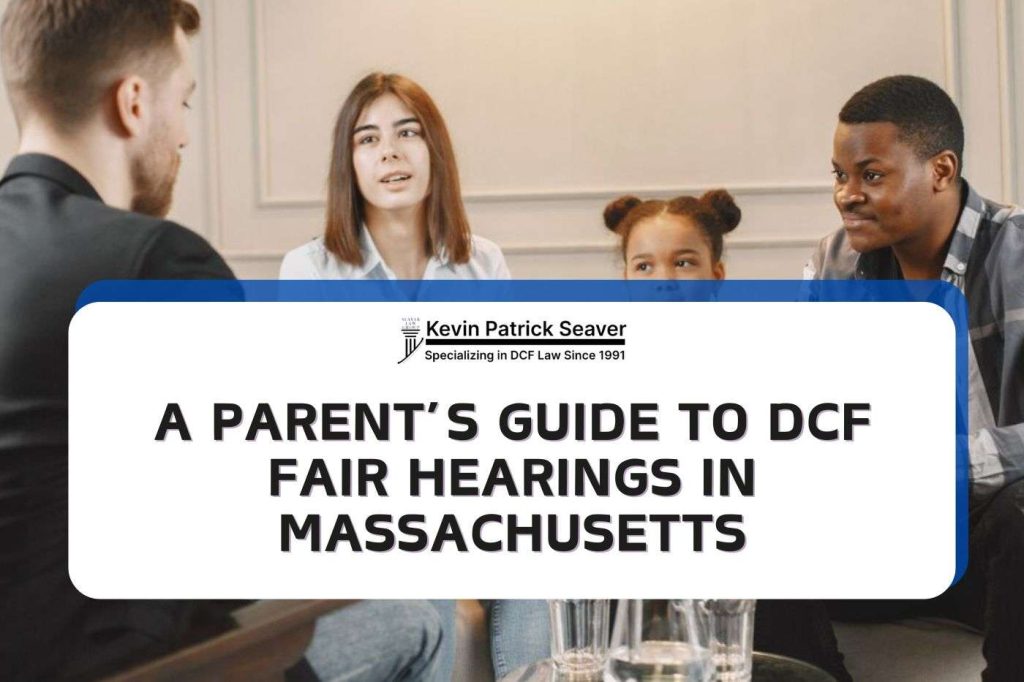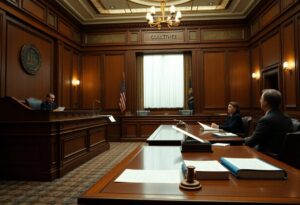A Parent’s Guide to DCF Fair Hearings in Massachusetts
Navigating an investigation and need to know more about DCF fair hearings? Your comprehensive guide is here!
Theodore and Mia are a couple living in Massachusetts with their two children. They’ve been having a rough time lately, with lots of arguments and stress. Both parents work multiple jobs to make ends meet, often missing dinner with their kids because of their schedules. What the neighbors don’t see is that Mia, despite her long hours, always prepares dinner and sets everything up for the kids before heading to work.
One evening, after hearing yet another loud argument and noticing that the parents weren’t home by dinner time again, a concerned neighbor called the Department of Children and Families (DCF). The neighbor worried that the children were being neglected, not knowing about Mia’s efforts to care for them despite her absence.
Shortly after, DCF intervened and an invasive investigation into their home began based on these concerns. The Department quickly decided that there was merit to the allegations, leading to a supported decision and an opened assessment. This plunges Theodore and Mia into one of the hardest battles of their lives: proving they are fit parents who, despite facing tough economic and personal challenges, provide a loving and stable environment for their children.
This guide will explain what happens at a DCF fair hearing, a crucial event where parents like Theodore and Mia can present their case. It’s their chance to explain the misunderstandings about their situation and to show that they are doing their best under difficult circumstances.
As you read on, you’ll find helpful information on how to navigate the hearing process, what evidence to gather, and how to effectively communicate your side of the story to DCF. This guide is designed to help parents understand and manage these challenging situations, offering hope and guidance to keep their family together.
Understanding the DCF Fair Hearing Process
DCF Fair Hearings are your chance to challenge decisions made by DCF. This formal proceeding is critical if DCF has made decisions you disagree with, such as supporting allegations of abuse or neglect. Here, you present your case before an impartial hearing officer, providing a structured platform to argue against these allegations and show why they may be unwarranted.
Key Stages of a DCF Hearing
Notification
You should first receive notification from DCF, which states their decision regarding each allegation and outlines how to appeal them. This notification is crucial as it starts a time period during which you have the right to appeal the decision(s).
- Immediate Action: Upon receipt of this letter, it is important to immediately request a fair hearing as you only have 30 days to do so.
- Gather Evidence: Then start gathering any evidence that can support your claim and negate the allegations. For Theodore and Mia, this meant collecting school reports and medical records that demonstrate their attentiveness to their children’s needs.
- Legal Strategy: Consulting with a lawyer experienced in DCF cases can significantly enhance your ability to navigate the hearing process effectively. They can help articulate why the alleged incidents do not constitute neglect or abuse under the proper legal definitions.
If you do not receive a notification/decision letter from DCF, contact an experienced DCF defense attorney to help you determine what to do next and whether a fair hearing is necessary.
Preparation
Once you are notified of the fair hearing date, preparation must begin immediately. This stage is critical for building a strong case to present at fair hearings.
- Document Collection: Gather all relevant documents, such as medical records, school reports, and character testimonials. For Theodore and Mia, this involved organizing a timeline of events and evidence of their proactive parenting.
- Witnesses: Organize a group of witnesses who can speak on your behalf to disprove the allegations and prove your parental fitness. This should include expert witnesses who can speak to the specific allegations.
- Legal Representation: Consider hiring a lawyer who specializes in DCF cases. They can offer expert advice and represent you during the hearing, ensuring that your parental rights are vigorously defended.
The Hearing
Fair hearings are your opportunity to challenge DCF’s allegations directly before the hearing officer.
- Present Evidence: Show any evidence that supports your case and contradicts the allegations. Theodore and Mia would present testimonies from neighbors and teachers to counter the initial claims.
- Witness Testimony: Bring witnesses who can testify to your parenting and the conditions at home. Friends, family, and professionals who know your family can provide powerful testimony.
- Cross-Examine the DCF Investigator: Use this time to clearly and calmly cross-examine the DCF investigator who made the decision to support the allegations in the first place.
- Submit a Written Appeal: In addition to the hearing, you have the right to submit a written appeal outlining the specific legal standards the investigator failed to meet.
Decision
After all evidence and arguments are presented, the hearing officer will deliberate and make a decision.
- Written Recommendation: You will receive a written letter detailing whether the fair hearing officer recommended the allegations be upheld or reversed. The DCF Commissioner then has 21 days to accept or deny the fair hearing officer’s recommendation
- Final Decision: After 21 days, you will receive the final decision from the Fair Hearing Unit with your fair hearing officer’s justification for the decision.
- Next Steps: If the decision is not in your favor, your lawyer can advise you on possible appeals or further actions in the Superior Court. For parents like Theodore and Mia, understanding all possible outcomes prepares them for either scenario.
Common Challenges and How to Address Them

Navigating DCF fair hearings involves several challenges, particularly when it concerns regaining custody of your child from DCF. The complexity of these cases can seem overwhelming, combined with the emotional strain of fighting for your reputation. However, strategic preparation can significantly mitigate these challenges.
Strategies to overcome challenges in fair hearings:
- Legal Complexity: Hire a DCF defense attorney who specializes in fair hearings. They can provide invaluable legal help, guide you through the process of fair hearings, and prepare you for potential scenarios where DCF upholds their decision.
- Emotional Strain: Prepare mentally and emotionally. Support from family, or professional counselors can help manage the stress associated with these types of cases.
By thoroughly understanding the legal terrain with the help of a DCF defense attorney, Theodore and Mia can effectively navigate the hearing.
Key Takeaway
DCF fair hearings are a daunting but manageable task when armed with the right knowledge and resources. By understanding the process of fair hearings, preparing effectively, responding assertively to allegations, and interacting professionally with social workers, you stand a better chance of overturning the allegations. It’s essential to recognize that while the journey to change a DCF decision can be challenging, thorough preparation and a clear understanding of your rights can significantly alter the outcome in your favor.
Need Expert Assistance at a DCF Fair Hearing? Call Kevin Seaver Today
Going through DCF Fair Hearings can be one of the most challenging experiences for any parent. If you’re asking, “How do I prove my innocence?” then you understand the importance of this moment. At the Law Office of Kevin Seaver, we specialize in DCF investigations, assessments, and fair hearings, bringing years of expertise directly to your case.
Don’t face this alone—call us today at (617) 263-2633 or book a consultation to find out how we can help you regain custody and bring your family back together.
Disclaimer
If you find yourself in this situation, it’s advisable to seek legal representation from a qualified attorney, like those at the Law Office of Kevin Seaver, who can advocate for your rights and guide you through the complex process of a DCF investigation.
Remember that the ultimate goal of DCF is to ensure the safety and well-being of children while supporting families in crisis.
Please note that this article does not create an Attorney-Client relationship between our law firm and the reader and is provided for informational purposes only. Information in this article does not apply to all readers.
Readers should not rely on this information as legal advice and should seek specific counsel from the attorney based on personal circumstances. Thank you.
Kevin Patrick Seaver is a Massachusetts DCF Defense Lawyer who represents parents against false child abuse allegations.






